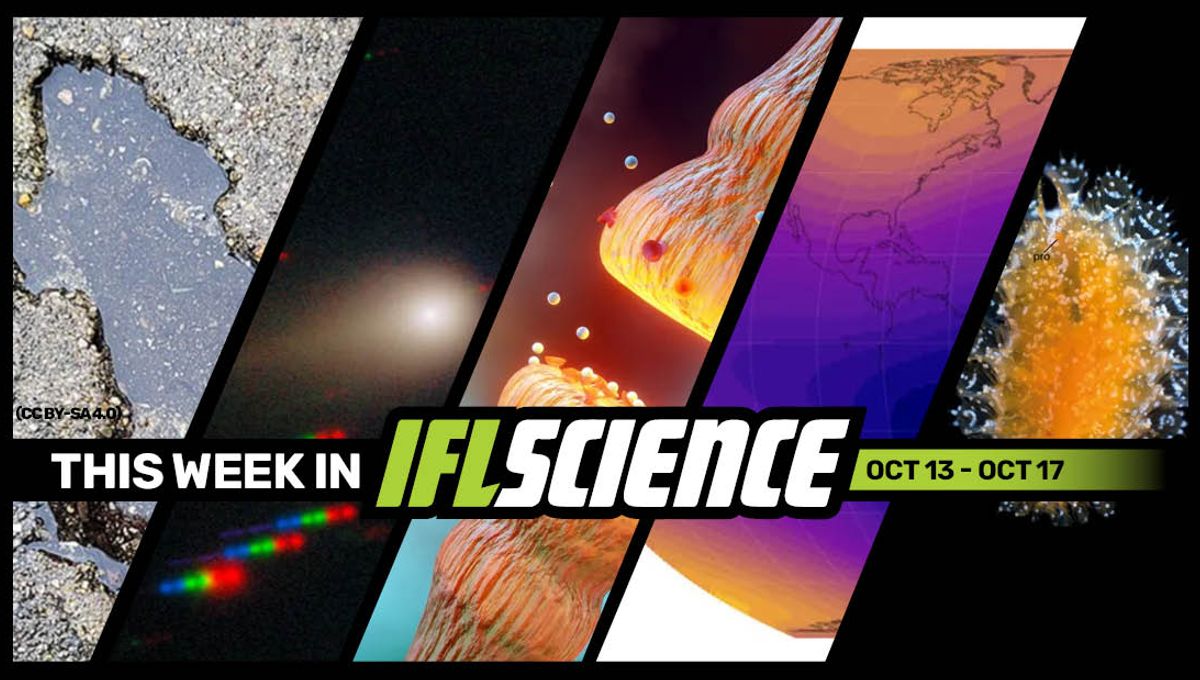
This week, an “anti-tail” and an odd 594-kilometer (369-mile) feature have been found on interstellar object 3I/ATLAS, brain training has been found to significantly improve key neurochemical levels in a world first, and 14 new ocean species have been discovered, including popcorn-like parasites and weird worms. Finally, we spoke with ESA astronaut Rosemary Coogan on all things astronaut training and the future of space exploration.
The rest of this article is behind a paywall. Please sign in or subscribe to access the full content.
Create an IFLScience account to get all the biggest science news delivered straight to your inbox every Wednesday and Saturday.
Scientists Studied The Infamous “Chicago Rat Hole” And They Have Some Bad News
If you have spent a little too long on the Internet, or have a keen interest in Illinois landmarks, you may already be aware of the infamous “Chicago rat hole”. In January 2024, X user WinslowDumaine posted an image of a sidewalk on West Roscoe Street in Chicago, Illinois. Known locally for around 20 years, the sidewalk contains an imprint of a small animal that appears to have suffered an unfortunate fate, quickly earning the “Chicago rat hole” viral fame. Read the full story here
“Anti-Tail” And Odd 594-Kilometer Feature Found On Interstellar Object 3I/ATLAS By Keck Observatory
Astronomers analyzing observations of interstellar comet 3I/ATLAS using the W. M. Keck Observatory have discovered further unusual features of our third interstellar visitor, and confirmed the presence of a rare “anti-solar tail”. Read the full story here
“This Is A Really Big Deal”: Brain Training Significantly Improves Key Neurochemical Levels In World First
In a world-first breakthrough, scientists have shown that 10 weeks of brain exercises using a game-like app are enough to significantly upregulate the production of vital chemical acetylcholine, something that no prior treatment has ever been able to do. Read the full story here
The South Atlantic’s Giant Weak Spot In The Earth’s Magnetic Field Is Growing
The Earth’s magnetic field has a giant weak spot roughly aligned with the south Atlantic, and 11 years of observations show it has grown dramatically in that time. The cause of the South Atlantic Anomaly (SAA) is still debated, but the changes show it is dynamic on a relatively short timescale, considering evidence it has persisted on geological timescales. Read the full story here
Popcorn-Like Parasites And Weird Worms Among 14 New Species Discovered In The World’s Oceans
Popcorn-like parasites, ghostly crustaceans, and creepy worms are among the 14 new species that have recently been found in the world’s oceans. Scientists estimate there are around 2 million living marine species, although just a tiny fraction of those have been officially named and described. In a push to close this knowledge gap, researchers have launched the Ocean Species Discoveries project, a streamlined approach to documenting marine life. Read the full story here
TWIS is published weekly on our Linkedin page, join us there for even more content.
Feature of the week:
IFLScience Meets: ESA Astronaut Rosemary Coogan On Astronaut Training And The Future Of Space Exploration
IFLScience was recently at the Open Day of the European Space Research and Technology Centre, which is seen as the technical heart of the European Space Agency (ESA). There, we had the opportunity to interview ESA astronaut Rosemary Coogan, who is part of the recently graduated Hopper class of astronauts. The name refers to their hope to be the ones who get to hop in the low-gravity environment of the Moon as well as travel to the International Space Station (ISS). Read the full story here
More content:
Have you seen our e-magazine, CURIOUS? Issue 39, October 2025, is available now. This month, we asked, “What Actually Is Fear?” – check it out for exclusive interviews, book excerpts, long reads, and more.
PLUS, the We Have Questions podcast – an audio version of our coveted CURIOUS e-magazine column – continues. In episode 13, we ask, “Can Transplants Change Your Personality?”
The Big Questions podcast has returned, and we’re continuing season 5 with episode 9’s big question: What Is Time And How Do We Measure It?
Source Link: Scientists Studied “Chicago Rat Hole” – They Have Bad News, The South Atlantic’s Magnetic Field Weak Spot Is Growing, And Much More This Week